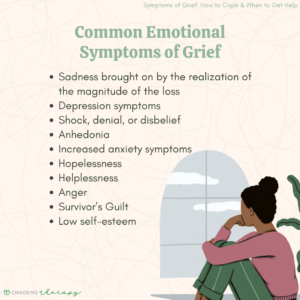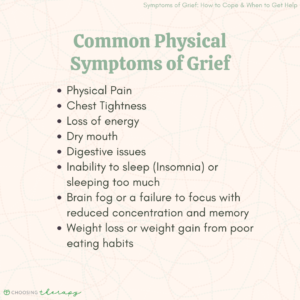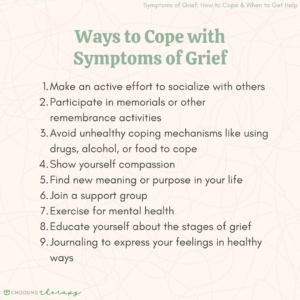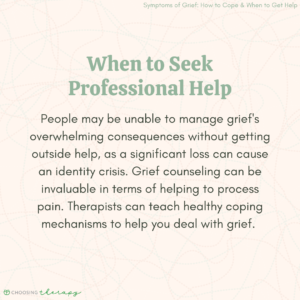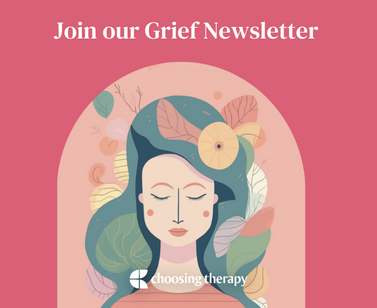Grief is a natural and involuntary human response after experiencing a significant loss with diverse reactions, including clusters of cognitive, emotional, somatic, and behavioral symptoms.1 These may include both physical and emotional symptoms such as body aches, digestive issues, sadness, and anxiety. Gaining insight into grief and its symptoms can help you cope with and process your loss.
Would you like to talk about your loss?
Therapists are patient and good listeners. BetterHelp has over 20,000 licensed therapists who provide convenient and affordable online therapy. BetterHelp starts at $65 per week. Take a Free Online Assessment and get matched with the right therapist for you.
What Is Grief?
Any profound life change or significant loss can trigger grief. Grief researchers define the many aspects of the grieving process, such as prolonged grief, revolve around the deficiencies in acceptance (yearning, disbelief, bitterness) and withdrawal (decreased social functioning, difficulty adjusting, emotional numbness, or detachment from others).2
Many factors influence how grief is experienced, including the individual’s previous experience with a similar loss. Whereas vulnerable people, such as those with low self-esteem, trust issues in others, previous psychiatric disorders, and suicidal ideation or attempts, will be the most susceptible to grief.3
Symptoms of grief can be caused by any loss, such as:
- Miscarriage
- Divorce
- Loss of a job
- Loss of a pet
- Loss of significant relationship
- Loss of a child
- Loss of a spouse
- Death of a parent
- Loss of a grandparent
- Diagnosis of a severe or terminal illness
- Loss of a dream
Types of Grief
Each individual experiences grief uniquely, and there are no right or wrong ways to grieve. There are different models for the stages of grief, including five stages of grief and seven stages of grief. People may not go through all steps, and some stages may last longer than others. The source of your grief can influence the type and severity of the grief symptoms.
There are many types of grief, including some of the following:
- Anticipatory grief: Anticipatory grief is a form of “grief work” before the actual loss, where the grieving person would slowly detach their bonds from the dying person.4
- Sudden Temporary Upsurge in Grief (STUGs): STUG is the sudden, unexpected increase in the intensity of grief symptoms even many years after a loss. Common triggers include birthdays, anniversary effects, holiday grief, or spending time in a place you may have visited with the lost loved one.
- Prolonged grief: Grief researchers describe prolonged grief as an intense yearning for and preoccupation of the deceased. It can cause reactive distress symptoms with difficulty processing reality, avoiding reminders of the loss, and emotional numbing.5
- Traumatic grief: Traumatic grief is when a person simultaneously experiences grief and trauma. Grief is the reaction to the loss, and trauma is the emotional response linked to it.
- Delayed grief: Sometimes, people do not have an immediate reaction to a significant loss. Delayed grief can occur weeks, months, or sometimes years after a loss. Reasons for the delay can include denial or shock. Sometimes, it takes longer for a person to process their loss.
- Complicated grief: This is also called persistent complex bereavement disorder. The emotional pain relating to a loss remains severe and worsens, prohibiting healing and the ability to function. Distinguishing characteristics of complicated grief are that the symptoms last longer and may heighten in intensity and frequency.
- Disenfranchised grief: People experience disenfranchised grief when they incur a loss that cannot be openly acknowledged, socially supported, or publicly mourned.6 Examples of this are deaths resulting from suicide or drug overdose. Support may be unavailable to these mourners.
Common Symptoms of Grief
Grief is an experience that is complicated and distinct for everyone who goes through it. Some may have both emotional and physical symptoms of grief. Others may just feel the emotional pain that comes from grief. It is not unusual for some people to not go through all of the designated stages of grief and may revisit each stage more than once. The duration and intensity of symptoms vary with each individual.
Common emotional symptoms of grief include the following:
- Sadness
- Depression symptoms
- Shock, denial, or disbelief
- Anhedonia or an inability to get pleasure from things that bring you joy
- Increased anxiety symptoms
- Hopelessness
- Helplessness
- Anger
- Survivor’s guilt
- Low self-esteem
Common physical symptoms of grief include:7
Help For Grief & Loss
Talk Therapy – Get personalized help in dealing with a loss from a licensed professional. BetterHelp offers online sessions by video or text. Free Assessment
Ketamine Program For Depression, Anxiety, and Trauma – Nue.life offers an at-home, evidence-based ketamine program supported by hundreds of clinical studies. Our clients feel rapid & lasting relief within hours after the first treatment. Learn More
Signs of a Grief Management Problem
Symptoms related to grief can become severe enough to affect daily functioning. An example of this is complicated grief, a case in which a person fails to adjust to their grief and experiences symptoms for more than a year after a loss.8 There is typically an intense yearning and confusion about how to move on with one’s life.
Signs that someone is struggling with a grief management problem include:
- Suicidal ideation
- Avoidance behaviors
- Inability to overcome hopelessness
- Extreme mental fatigue and physical exhaustion
- Ongoing development of clinical depression
- Social isolation
- Guilt about things that could have been said
- Shame about an inability to save a person who has died
- Suspension of self-care habits
9 Ways to Cope With Symptoms of Grief
When faced with the physical and emotional challenges grief can impose, it is difficult to engage in self-care actions. Still, there are things you can do to help with your grief management and self-care. It is imperative to take action when your grief symptoms interfere with your ability to function and hurt your relationships.
Here are nine coping mechanisms for people experiencing overwhelming symptoms from grief:
- Stay social: Many people grieving tend to isolate themselves, which is unhealthy. Reach out to people you trust and feel comfortable spending time with as it can be a great source of comfort and support.
- Participate in memorials or other remembrance activities: Surrounding yourself with people who also care about the person that has died can help you feel less alone. Hearing stories from others about how your deceased loved one touched their lives can be a great way to develop new memories and grief rituals.
- Avoid unhealthy coping mechanisms: Substance use and binge eating are unhealthy coping mechanisms that can alter your thinking, cognition, and sleep, causing harmful physical and psychological consequences.
- Show yourself compassion: Be kind and caring towards yourself. Make time to get enough sleep and eat three healthy meals a day. Nurture your body as it will help calm your mind and stabilize emotions, freeing yourself from additional self-judgment.
- Find new meaning or purpose in your life: Grief can cause difficult self-reflection. One healthy way to cope is to channel your grief in meaningful ways. One example is if you lose someone to suicide, it can be beneficial to volunteer with or work for suicide prevention programs. Ask yourself what you can do to honor the memory and legacy of the person you have lost.
- Join a support group: In-person or online support groups can be a great source of comfort and support. It also helps you gain insights into what you are experiencing.
- Exercise: Exercise benefits mental health by elevating and stabilizing mood and increasing energy by releasing neurotransmitters like dopamine and epinephrine into the body.
- Educate yourself about grief: Learning about facts and myths about grief stages and how it works can help you prepare for what to expect and normalize what you’re feeling.
- Journal: Journaling helps you gain self-understanding and facilitates processing emotions. It can also be a way to track the ups and downs of your grief process.
When to Seek Professional Help
People may be unable to manage grief’s overwhelming consequences without getting outside help, as a significant loss can cause an identity crisis. Grief counseling can be invaluable in terms of helping to process pain. Therapists can teach healthy coping mechanisms to help you deal with grief. You can start finding a therapist who specializes in grief and loss in your area’s online therapist directory.
For people suffering from severe depression or anxiety caused by grief that continues or gets worse, medication management may be a helpful intervention. Depression medications, such as antidepressants, increase neurotransmitters that help to elevate and stabilize mood. Medications to treat anxiety release neurotransmitters that allow you to feel calmer and also help to improve sleep. Talk to your primary care physician to see if medication is right for you and about seeing a psychiatrist.
Final Thoughts
Grief is a unique and personal experience for everybody. Don’t judge yourself or tell yourself what you should or shouldn’t do while grieving. Just acknowledge and accept what you are experiencing in the wake of a significant loss. Although you may feel alone, there are people and places where you can find the support you need. If your symptoms remain or worsen with time, you may need help with your grief management. Address your physical and emotional symptoms as you work through practicing self-patience to help you begin your healing process.
Additional Resources
To help our readers take the next step in their mental health journey, Choosing Therapy has partnered with leaders in mental health and wellness. Choosing Therapy is compensated for marketing by the companies included below.
Online Therapy
BetterHelp Get support and guidance from a licensed therapist. BetterHelp has over 20,000 therapists who provide convenient and affordable online therapy. Take A Free Online Assessment and get matched with the right therapist for you. Free Assessment
Ketamine Program For Depression, Anxiety, and Trauma
Nue.life offers an at-home, evidence-based ketamine program supported by hundreds of clinical studies. Our clients feel rapid & lasting relief within hours after the first treatment. Learn More
Grief And Loss Newsletter
A free newsletter from Choosing Therapy for those impacted by the loss of a loved one. Get encouragement, helpful tips, and the latest information. Sign Up
Best Online Therapy Services There are a number of factors to consider when trying to determine which online therapy platform is going to be the best fit for you. It’s important to be mindful of what each platform costs, the services they provide you with, their providers’ training and level of expertise, and several other important criteria.
Best Online Psychiatry Services Online psychiatry, sometimes called telepsychiatry, platforms offer medication management by phone, video, or secure messaging for a variety of mental health conditions. In some cases, online psychiatry may be more affordable than seeing an in-person provider. Mental health treatment has expanded to include many online psychiatry and therapy services. With so many choices, it can feel overwhelming to find the one that is right for you.






